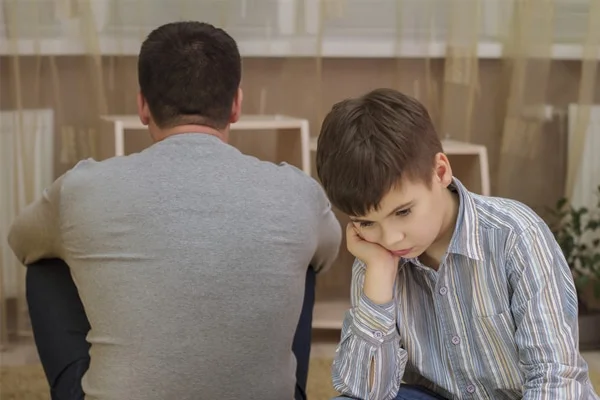Do you have a narcissistic father? If so, you’re not alone. Narcissism is more common than many people think, and it can be very damaging to the people close to the narcissist. In this blog post, we will discuss what narcissism is, the signs of a narcissistic father, and how to deal with a narcissistic father. We hope that this information will help you understand and cope with your situation better.
Contents
- 1 What Is Narcissism?
- 2 What Is Narcissistic Father?
- 3 Signs of Narcissistic Father
- 4 Reasons of Narcissistic Father
- 5 Negative Impacts of Narcissistic Father
- 6 Diagnosis of Narcissism In Father?
- 7 Treatment of Narcissistic Father
- 8 Impacts of Narcissistic Father On Children
- 9 How To Communicate With Narcissistic Father?
- 10 A Word From Therapy Mantra
What Is Narcissism?
 Narcissism is a mental disorder that is characterized by an inflated sense of self-worth, a need for admiration, and a lack of empathy.
Narcissism is a mental disorder that is characterized by an inflated sense of self-worth, a need for admiration, and a lack of empathy.
A person with narcissistic personality disorder (NPD) has an excessive sense of self-importance and believes that he or she is superior to others. They require constant affirmation and admiration from others and often have a sense of entitlement. People with NPD are usually very sensitive to criticism and can be easily hurt. They may also have a history of being overbearing or aggressive.
What Is Narcissistic Father?
 A narcissistic father is a father with a narcissistic personality disorder. This means that he has an excessive sense of self-importance, believes that he is superior to others, and requires constant affirmation and admiration from others. He may also have a history of being overbearing or aggressive.
A narcissistic father is a father with a narcissistic personality disorder. This means that he has an excessive sense of self-importance, believes that he is superior to others, and requires constant affirmation and admiration from others. He may also have a history of being overbearing or aggressive.
A narcissistic father can be very damaging to his children. He often puts his own needs above those of his kids, and may even use them to meet his own needs for admiration and power. A narcissistic father can make it difficult for his children to develop healthy relationships later in life.
If you are the child of a narcissistic father, there are things you can do to protect yourself. It is important to have boundaries with your dad and not let him manipulate you emotionally. You should also seek out support from other people, such as therapists or support groups.
Signs of Narcissistic Father

There are many signs of a narcissistic father. Some of these are:
Self-centered Behavior
There is a strong focus on the father’s needs and wants, while the children are often ignored. A narc father may expect the child to be available whenever he wants and demands constant attention.
Excessive Need for Admiration
The father is very needy and constantly looks for validation and admiration from others, often through his children. He may require them to brag about him to their friends or give him excessive compliments.
Lack of Empathy
The father has difficulty understanding or feeling empathy for others, especially his children. He does not see them as separate individuals with their own feelings and needs, but rather as extensions of himself.
Poor Boundaries
Narcissistic fathers often have poor boundaries when it comes to their relationships with their children. They may cross lines by trying to control what the child does or how they behave. This also includes inappropriate sexual behavior.
Manipulative
A narcissistic father can be very manipulative when it comes to his relationships with others, especially his children. He may use guilt trips or threats in order to get what he wants. This means that the child often feels like they are walking on eggshells around their dad.
Lack of Consistency
One of the hallmarks of narcissism is a lack of consistency. This means that the father may be loving and caring one moment, but then turn around and be cold and rejecting the next. This can make it difficult for the child to form a stable sense of self.
Lack of Support
A narcissistic father often does not provide emotional or practical support to his children. He may be too wrapped up in himself to be there for them when they need him. This can leave the child feeling isolated and unsupported.
Arrogance
Arrogance is common in narcissists and can be seen in the father’s behavior. He may act like he knows everything and is always right. This can make it difficult for the child to get input or feedback from him.
Possessiveness
Possessiveness is another common trait in narcissists. A narcissistic father may be very jealous of his children and try to control their lives. He may also become angry if they spend time with other people, especially those he perceives as a threat.
Reasons of Narcissistic Father

There can be many causes of a narcissistic father. Some of these may include:
History of Abuse
If the father was abused himself as a child, he may be more likely to become a narcissist. He may have learned that in order to survive, he had to put his own needs above everyone else’s.
Parental Narcissism
If one or both parents were narcissists, there is a greater chance that their children will become narcissists too. This is because they learn how to behave from watching their parents.
Excessive Praise and Overindulgence
Sometimes if a child is constantly praised for everything they do, it can lead to them becoming narcissistic later on in life. This is because they start to believe that they are better than others and don’t need to put in any effort. This can also happen if the child is excessively overindulged by their parents.
Neglect
Neglect can also lead to a child becoming narcissistic. If the child doesn’t feel seen or heard by their parents, they may start to put all of their energy into seeking validation from others. There can be many other reasons why a child may become a narcissistic father, but these are some of the most common.
Genes
Sometimes genes can play a role in whether or not someone becomes a narcissist. If the father has narcissistic tendencies, there is a greater chance that his children will have them too. These can be passed down from generation to generation.
Negative Impacts of Narcissistic Father

There can be many negative impacts of having a narcissistic father. Some of these include:
Low Self-Esteem
If the child is constantly told by their father that they are worthless and no good, they will start to believe it. This can lead to them having low self-esteem which can affect every aspect of their lives.
Depression
The lack of support and emotional connection from a narcissistic father can often lead to depression in the child. They may feel like there is nowhere to turn for help and this can be very isolating.
Anxiety
The constant manipulation and unpredictability of a narcissistic father can cause the child to develop anxiety disorders. They may never know what mood dad will be in or what he will do next, which makes it hard to relax and feel safe.
Eating Disorders
If the child is trying to please their father by being thin, they may develop an eating disorder. This is because they see it as one way to gain approval and love from a person who is never satisfied.
Addiction
Many children of narcissistic fathers grow up to become addicts themselves. They may use drugs or alcohol as a way to self-medicate the pain they are feeling. This can be very destructive and lead them down a path of destruction.
Relationship Problems
The child may have trouble forming healthy relationships later in life due to the dysfunction that was present in their family growing up. They may find it difficult to trust people and be overly dependent on others.
Diagnosis of Narcissism In Father?

There can be many signs that a father is narcissistic. If you are worried that your father may be a narcissist, there are some questions you can ask yourself. Do they have an excessive need for admiration? Are they often in conflict with others? Do they lack empathy for others? If you answer yes to most of these questions, it is likely that your father has narcissistic tendencies.
There can be many tests as well that can be used to diagnose narcissism. One of the most common is the Narcissistic Personality Inventory (NPI). This test looks at how someone scores on a number of different areas, such as vanity, entitlement, and arrogance.
If you think that your father may be a narcissist, it is important to seek help. There are many resources available for those who are affected by parental narcissism. You don’t have to suffer in silence.
Treatment of Narcissistic Father

There can be many different treatments for a narcissistic father. One of the most important is therapy. This can help the child understand what happened in their family and why they may feel the way they do. It can also help them learn how to cope with any symptoms they are experiencing.
Support Groups
There are also many support groups available for children of narcissistic fathers. This can be a great place to share your experiences and feelings with others who understand what you are going through. It also can be a great place to find advice and support.
Education
It is important that the child has a strong sense of self-worth, which can be gained by getting a good education. This will give them something that is theirs and nobody can take away from them. Education can also be a great alternative for the child to focus on instead of the negative aspects of their home life.
Medications
Medications are always a very important part of someone’s treatment plan. If the child is suffering from depression, anxiety, or any other mental health disorder, they may need to be prescribed medication by a doctor.
Therapy
Therapy can also be a great way for the child to get help dealing with their father’s narcissism. The therapist can help them understand what is happening in their family and why they may be feeling the way they do. They can also teach the child how to cope with any symptoms they are experiencing.
Counseling
This is also a very important step in helping the child deal with their father’s narcissism. Counseling can help them understand the dynamics that were present in their family and how it has affected them. It can also provide them with support to get through this difficult time.
Impacts of Narcissistic Father On Children

Narcissistic fathers can have a number of impacts on their children. These impacts can be both emotional and behavioral. Some of the impacts include:
Anxiety
Anxiety is one of the most common symptoms that children of narcissistic fathers experience. This can be due to the fact that they are constantly dealing with chaos and unpredictability in their home life.
Depression
Children of narcissistic fathers are also at a higher risk for depression. This can be due to the fact that they often feel alone and unsupported. They may also feel like they are not good enough or worthy of love and attention.
Low Self-Esteem
Another common impact of a narcissistic father is low self-esteem. This can be due to the constant criticism and lack of approval from their father. The child may also feel like they are never good enough no matter what they do.
Behavioral Issues
There can be a number of behavioral issues that children of narcissistic fathers experience. These can include problems with aggression, defiance, and acting out. There may be a need for the child to be constantly in control in order to avoid any type of emotional outburst from their father.
Substance Abuse
There is also a higher risk for the child to develop a substance abuse problem. This can be due to the fact that they may be using drugs or alcohol as a way to cope with the stress and emotions they are experiencing.
How To Communicate With Narcissistic Father?

There are many ways through which one can communicate with a narcissistic father. Some of these are:
Try to Keep Communication Positive
It is important to try to keep the communication positive. This will help build a better relationship with your father. If you are constantly arguing or fighting, it will only make things worse.
Set Boundaries
You also need to set boundaries with your father. This means that you should not let him cross certain lines, such as taking advantage of you emotionally or financially. You have to be firm and stand up for yourself.
Be Honest
Always be honest with your father. He may not like it, but he needs to know how you feel. Honesty is the key to any good relationship. You can also be honest about the things you need from him.
Be Patient
It is going to take time for your father to change his ways. Do not expect miracles overnight. Be patient and let the relationship evolve over time.
Don’t Criticize
Do not criticize your father, even if he deserves it. This will only make him defensive and he will be less likely to listen to what you have to say. Try to stay positive, even if it is difficult.
Stay Calm
When communicating with a narcissistic father, it is important to stay calm. If you get emotional or start yelling, he will only become more defensive and closed off. Stay calm and collected so that you can effectively communicate with him.
Conclusion
Narcissistic fathers can have a number of impacts on their children. It is important for the child to get help in order to deal with these impacts. This can be done through counseling, which can provide them with the support they need. There are many ways through which one can communicate with a narcissistic father and it is important to find what works best for you. Try to stay positive and patient as you work to build a better relationship with your father.
A Word From Therapy Mantra
Your mental health — your psychological, emotional, and social well-being — has an impact on every aspect of your life. Positive mental health essentially allows you to effectively deal with life’s everyday challenges.
At Mantra Care, we have a team of therapists who provide affordable online therapy to assist you with issues such as depression, anxiety, stress, relationship, OCD, LGBTQ, and PTSD. You can take our mental health test. You can also book a free therapy or download our free Android or iOS app.


